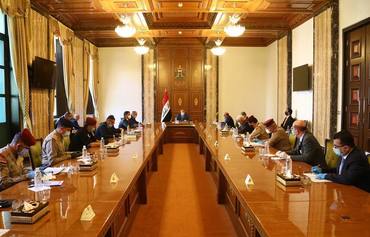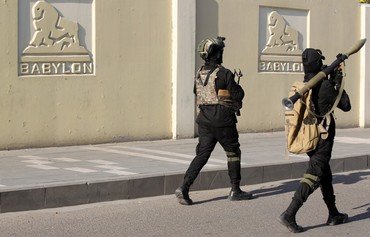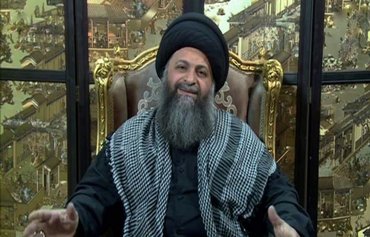Despite an increase in the frequency of militia attacks on international interests in Iraq, which observers see as an attempt to discredit the government, reforms are still moving ahead, albeit slowly, they said.
Sheikh Thaer al-Bayati, a spokesman for the Arab Tribal Council in Salaheddine province, said that armed factions loyal to Iran are "responsible for all the problems in the country".
"They are trying to undermine reforms and resist any plan to enforce the rule of law and restore the power of the state. The chaos gives them a fertile ground to grow and expand," he told Diyaruna.
Al-Bayati said these factions plan to keep Iraq mired in the chaos caused by armed violence, instability, widespread corruption and economic crises.
![The British-American company G4S's office in Baghdad was hit by a bomb in early September. [Photo circulated on social media]](/cnmi_di/images/2020/09/28/26206-Iraq-reforms-militia-600_384.jpg)
The British-American company G4S's office in Baghdad was hit by a bomb in early September. [Photo circulated on social media]
They pose great danger to security and civil peace and harm Iraq's national interests and its relations with the international community, he added.
Attacks on international targets on the rise
Following IRGC's Quds Force commander Qassem Soleimani's assassination in January, some IRGC elements accused the company providing security for Baghdad Airport (G4S) of being an accomplice in the killing.
On September 3rd, a drone dropped a small bomb on the headquarters of the British-American security company in Baghdad's al-Qadisiyah residential neighborhood. No one claimed responsibility for the attack.
Since late last year, more than 30 rocket attacks have targeted Iraqi installations hosting foreign diplomats or troops.
Such attacks are rarely claimed, but Washington has blamed pro-Iran factions in Iraq, primarily Kataib Hizbullah.
More recently, attacks using improvised explosive devices (IEDs) have shifted towards logistical support contractors of the international coalition in Iraq.
On August 26th, an IED exploded as a UN convoy passed through the Mosul-Erbil highway. A group that identified itself as part of the pro-IRGC Islamic Resistance claimed responsibility for the incident.
Political analyst Ahmed Shawqi told Diyaruna the threat posed by militias operating under the umbrella of the PMF is growing. He said these groups use the PMF as a cover to legitimise their presence while implementing the Iranian regime's agenda.
With the recent escalation in operations, he said, militias appear to be sending a message to the Iraqi government that they are "ready to do anything to preserve their interests and connection with the [IRGC]".
"They intend to embarrass Iraqi prime minister Mustafa Kadhemi, who pledged to the Iraqi people and the world that he would restore the honour of the state and the rule of law," Shawqi said.
However, despite obstacles in the way of government reforms, "progress is being made at a slow pace", he said.
Government presses on with reforms
The government does not want to clash with proxy groups for fear of worsening the situation in Iraq, Shawqi said. But recent measures have "angered and scared the militias, which is a positive development".
In July, the Iraqi government announced plans to secure border crossings and ports by cracking down on smuggling, a source of funding for militias. A month later, it formed an investigative committee to prosecute corruption.
On September 5th, Iraqi forces launched "Operation Promises Kept" to confiscate unlicensed weapons in Baghdad and Basra. The operation will be carried out in other provinces.
An Iraqi parliament member, who wished to remain anonymous, told Diyaruna the government is seeking to restrict weapons to security forces in its effort to stress that there is no authority higher than that of the state and the law.
He said the operation has resulted in the arrest of dozens of wanted individuals and the confiscation of a large quantity of arms and ammunition.

![Iraqi Prime Minister Mustafa Kadhemi meets with officials in May to discuss government reforms. [Photo via the Office of Iraqi Prime Minister]](/cnmi_di/images/2020/09/28/26205-Iraq-Kadhimi-reform-600_384.jpg)






